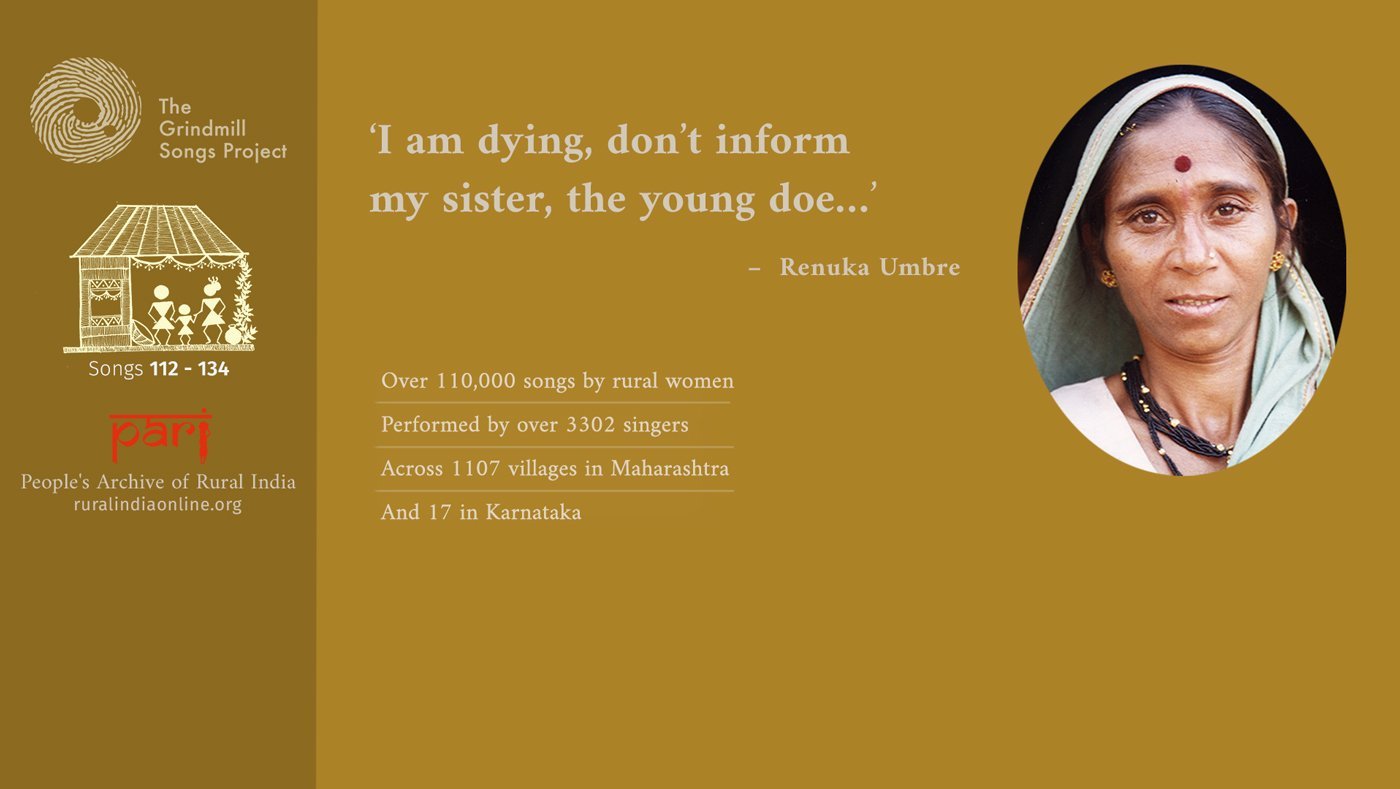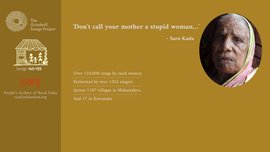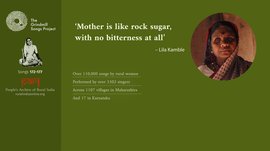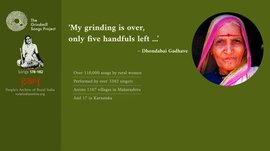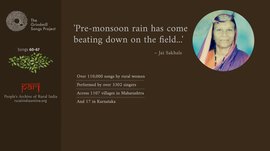Continuing the Grindmill Songs Project on PARI with 23 couplets by Renuka Umbre of Rajmachi village in Pune district – about a woman’s steadily growing illness and eventual death, and the grief of her siblings and parents, who give her comfort throughout this process
“I sing only grindmill songs and festival songs," Renuka Umbre told the original Grindmill Songs Project team in 1997. But even that, she said, was on the decline for some years. “Now the tourists come,” she said, referring to the growth of homestays in her village. “We have to look after them, so we do not get much time to sing. Now I don’t remember many of them [ ovi ], though I like to sing and express myself…”
Renuka lived in Rajmachi village, situated at the foot of a hill in Mawal taluka of Pune district, when the original grindmill songs team visited her two decades ago. Her family cultivated red millet on land owned by others. They had recently bought some land in Raigad district where they cultivated paddy. At times, they went there for a week, sometimes for a day-trip. To reach their farm they had to cross a mountain on foot.
Renuka Umbre’s voice was very melodious. She knew many grindmill songs, which she had learnt from her mother in childhood, and later from her husband’s aunt. Renuka told us that to sing ovi – couplets women in rural Maharashtra sing while working at the grindmill – the singers usually do not use a high pitch because it is tiring when they have to grind at the same time. Like other women who are experts at singing ovi , she too did not change the tune for at least 10 songs once she started singing about a theme.
Renuka told us that she did not sing bhajans or gaulan ( gaulan are folk songs that village women sing in the mornings while walking to the river to fill water and while at the river; like many villages, Rajmachi did not have tap water).
The ovi Renuka Umbre sang were first serialised on PARI in the March 29, 2017 edition of the Grindmill Songs Project.
In the audio featured here, Renuka sings 23 ovi that tell us the story of a woman from the time she gets a headache till it becomes a serious illness to which she finally succumbs. Every couplet speaks of the woman’s love for her siblings and parents. The ovi also imply her expectation that they too should feel the same depth of love for her.
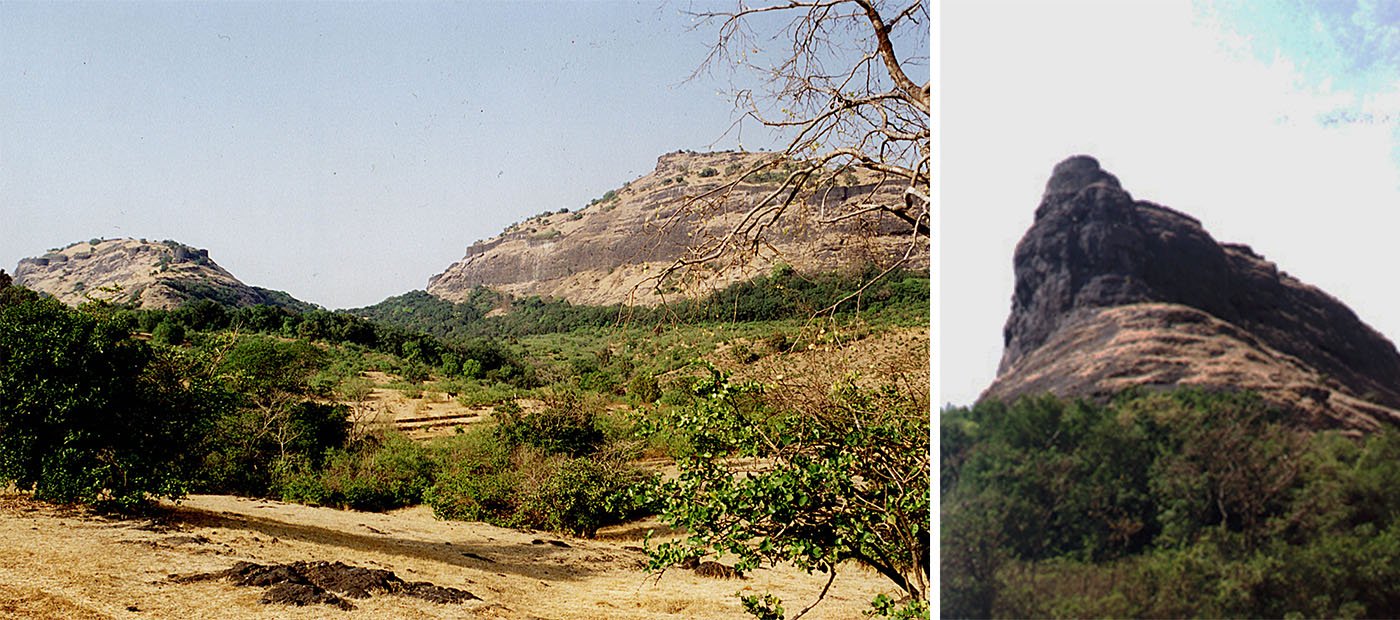
The foothills of Rajmachi , Renuka Umbre's village in Maval
taluka
(photographs from 1997)
This is the story the songs tell us:
I have a headache and my dear brother is making suntha [dry ginger] paste to apply on my forehead. The headache is now more severe, I can feel my head splitting at the parting of my hair. Send a note quickly to call my dear brother, the doctor.* Feeling unwell and restless, I toss and turn on the bed, changing sides from head to feet. My dear brother will put my head on a pillow and that will give me some rest.
My brother is in the field, don’t tell him about my illness, for it will give a sour taste to the food he eats. Don’t tell my brother on the mountain, the ghongadi * (thick black blanket) he carries will seem more heavy. I feel I am dying, my younger sister lives far away, do not tell her, the young doe, for she will throw herself on the floor in grief. Do not tell this news suddenly to my brother for he will be shocked and will drop the tumbler of water as he washes his face at the end of a hard day of work. He will rush to see me, lantern in hand.
My heart feels heavy and I feel restless, my younger sister puts my head on her lap to comfort me, and my mynah, my little sister, is also coming to see me, while my relative* stays out of the sun.
Now in my brother’s verandah, with my head on his lap, I breathe my last even as my clothes - blouse and saree – (the fresh ones) hang from the wooden peg and also (the washed ones) from the wooden rod. I am not alive now, my soul is on the tree watching my mother taking care of my body.
A married woman is fortunate to die while her husband lives. The gods in heaven will welcome her with an arati [lit lamps on a platter]. I tell my friend, when a married woman dies, her young children cry for her, ‘ Aai , Aai ’. My friend says, you did well for yourself, dying while your husband lives, but the young baby will suffer.
Ahev * (a woman whose husband is alive) has died, with her nose ring still intact, she rejoices that death has come to her before her beloved husband. As the smoke from the pyre in the shade on the hillock spreads in the sky, the parents of the woman say that their son-in-law is a good man. Many people have gathered there, but the father feels alone in his grief. In the midst of all the family and relatives, the mother grieves the loss of her daughter.
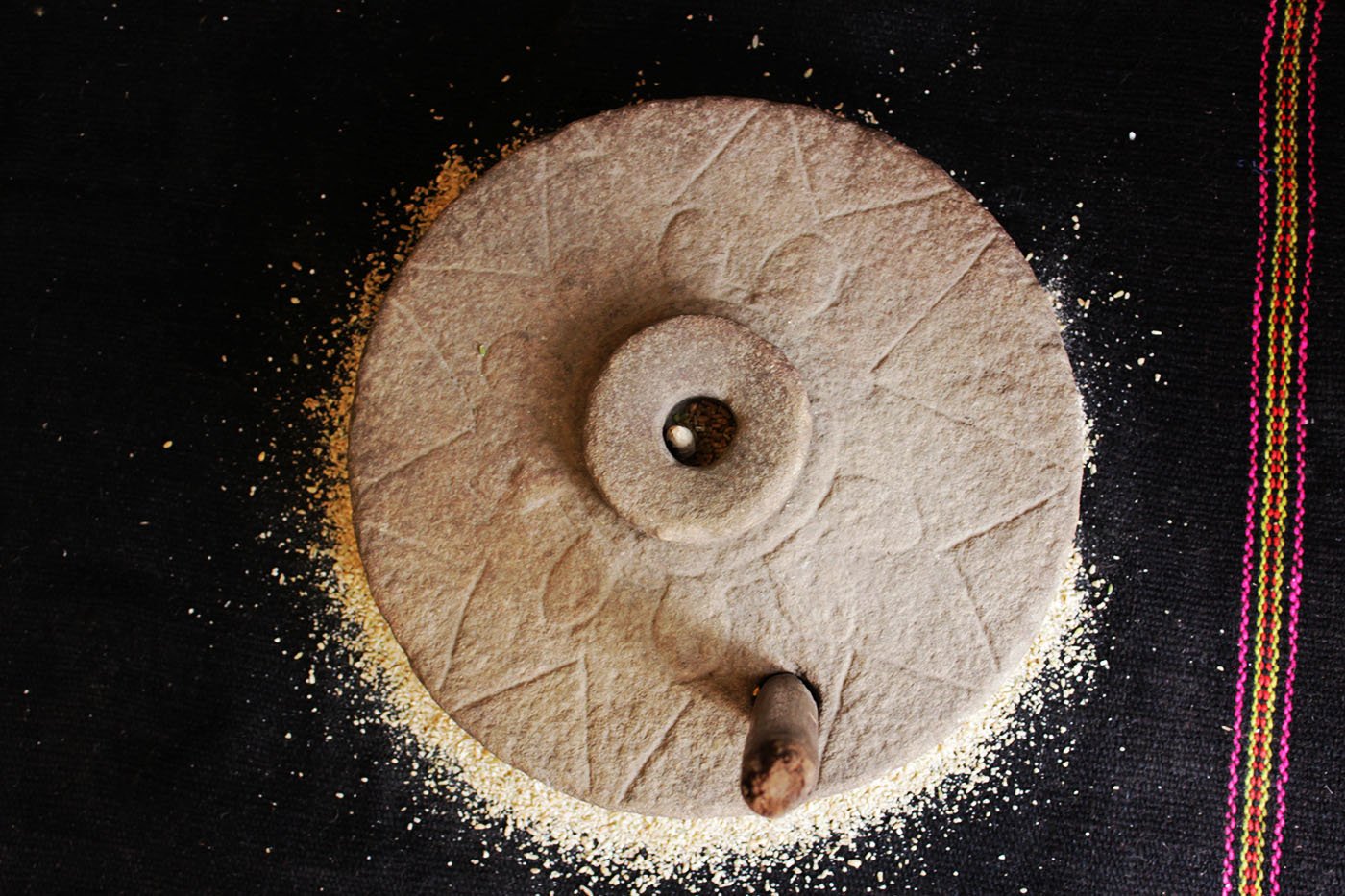
'Now my life has gone and it sits on the tree', sings Renuka Umbre
Notes:
Doctor: The brother always helps and makes his sister feel better when she is ill, so he is called a ‘doctor’.
Ghongadi : A black blanket made of sheep wool. It is used daily by peasants for various purposes, especially when they have to walk long distances and halt in the open under a tree or in somebody’s house as a guest, or when they need to protect themselves from the cold and rains.
Relative: When a woman is ill, the family closest to her, like her siblings, come over to see her and give comfort. But a relative – like a brother-in-law or a son-in-law – is likely to find excuses for not coming, and so, as the ovi describes it, he “stays out of the sun.”
Ahev : a woman whose husband is alive. When a married woman dies before her spouse, her corpse is wrapped in a green saree, new black beads are put around the neck, and red vermillion on the whole forehead. A lot of flowers are spread on the body and the procession is accompanied by the playing of musical instruments. The husband walks ahead. A woman rejoices in such a death.
जीवाला जड भारी, डोक दुखत कपाळी
ताईत बंधुराई, सुंठ उगाळी गोपाळी
जिवाला जड भारी, डोक दुखत भांगपट्टी
ताईत बंधुराई माझ्या, वैदाला धाडा चीठी
जिवाला जड भारी, डोक दुखत केसामधी
पाठीची माझी बाई, हाये दूरला देशामधी
जिवाला जड भारी, माझ्या उश्याचा पायथार
येईल बंधुराज, मला करील सोईवार
जिवाला जडभारी, नका कळवू रानामधी
माझ्या ना बंधवाची, कडू लागल पानामधी
जीवाला जडभारी, नका कळवू डोंगयरी
बंधनावाला माझ्या, जडं होईल घोंगयडी
जिवाला जड भारी, नका कळवू हरणीला
पाठीची माझी बाई, अंग टाकील धरणीला
आता जिवाला जडभारी, नका कळवू येकायेकी
असा ताईत बंधुराया, तांब्या ठेवील तोंड धुता
जिवाला जड भारी, नका कळवू जावूनी
ताईत बंधुराई, येईल कंदील लावूनी
आता जिवाला जडभारी, जीव करीतो उलघाली
जीव करीतो उलघाली, सोयरा माणूस उन टाळी
जिवाला जडभारी, जीव करीतो उलघाली
पाठीची माझी बहिण, हिनी उशाशी मांडी दिली
जिवाला जडभारी, जीव करीतो उलघाल
आता ना माझी बाई माझी, साळुंखी वाट चाल
आता जीव ना काही गेला, माझ्या बंधुच्या वटीवरी
अशी चोळी ना पातळाची घडी, राहीली खुंटीवरी
आता जीवू ना काही गेला, माझ्या बंधुच्या मांडीवरी
आता चोळीना पातळाची घडी, राहीली दांडीवरी
आता जीव ना काही गेला, जाऊन बसला झाडावरी
अशी आता ना माझी बाई, माझ्या कुडीची सेवा करी
आता अहेव मेली नार, गेली नवरी होवूउनी
आता सरगीच देवू उभे, आरती घेवूनी
आता आहेव मेली नार, बाळ करीतो आई आई
आता सांगते सयेपाशी, तान्ह्या बाळाला करु काई
आता आहेवू मेली नार, हे गं तुपल बरं केलं
तुपल बरं केलं, तान्ह्या बाळाचं हाल झालं
आहेव मेली नार, हिच्या नाकामधी नथ
अशी भरतार राजाआधी, गेली डंका ही वाजवीत
आता आहेव मेली नार, धूर गंगला पांगयला
आता बाप ग काही बोल, लेकी सोईरा चांगयल
आता आहेव मेली नार, धुर गंगला दाटयल
आता बाप ग माई बोल, लेकी सोईरा तुटयला
आता आहेव मेली नार, सरण जळतं टेपायालु
आता येवढ्या गोतामंदी दुख एकल्या बापायालु
आता आहेव मेली नार, सरण जळतं सावलीलु
आता येवढ्या गोतामंदी दुख एकल्या मावलीलु
jīvālā jaḍa bhārī ḍōka dukhata kapāḷī
tāīta bandhurāī suṇṭha ugāḷī gōpāḷī
jivālā jaḍa bhārī ḍōka dukhata bhāṅgapaṭṭī
tāīta bandhurāī mājhyā vaidālā dhāḍā cīṭhī
jivālā jaḍa bhārī ḍōka dukhata kēsāmadhī
pāṭhīcī mājhī bāī hāyē duralā dēśāmadhī
jivālā jaḍa bhārī mājhyā uśyācā pāyathāra
yēīla bandhurāja malā karīla sōīvāra
jivālā jaḍabhārī nakā kaḷavū rānāmadhī
mājhyā nā bandhavācī kaḍū lāgala pānāmadhī
jīvālā jaḍabhārī nakā kaḷavū ḍōṅgayarī
bandhanāvālā mājhyā jaḍa hōīla ghōṅgayaḍī
jivālā jaḍa bhārī nakā kaḷavū haraṇīlā
pāṭhīcī mājhī bāī aṅga ṭākīla dharaṇīlā
ātā jivālā jaḍabhārī nakā kaḷavū yēkāyēkī
asā tāīta bandhurāyā tāmbyā ṭhēvīla tōṇḍa dhutā
jivālā jaḍa bhārī nakā kaḷavū jāvūnī
tāīta bandhu rāī yēīla kandīla lāvūnī
ātā jivālā jaḍabhārī jīva karītō ulaghālī
jīva karītō ulaghālī sōyarā māṇūsa una ṭāḷī
jivālā jaḍabhārī jīva karītō ulaghālī
pāṭhīcī mājhī bahiṇa hinī uśāśī māṇḍī dilī
jivālā jaḍabhārī jīva karītō ulaghāla
ātā nā bāī mājhī sāḷuṅkhī vāṭa cāla
ātā jīva nā kāhī gēlā mājhyā bandhucyā vaṭīvarī
aśī cōḷī nā pātaḷācī ghaḍī rāhīlī khuṇṭīvarī
ātā jīvū nā kāhī gēlā mājhyā bandhucyā māṇḍīvarī
ātā cōḷīnā pātaḷācī ghaḍī rāhīla dāṇḍīvarī
ātā jīva nā kāhī gēlā jāūna basala jhāḍāvarī
aśī ātā nā mājhī bāī mājhyā kuḍīcī sēvā karī
ātā ahēva mēlī nāra gēlī navarī hōvūīnī
ātā saragīca dēvū ubhē āratī ghēvūnī
ātā āhēva mēlī nāra bāḷa karītō āī āī
ātā sāṅgatē sayēpāśī tānhyā bāḷālā karu kāī
ātā āhēvū mēlī nāra hē ga tupala bara kēla
tupala bara kēla tānhyā bāḷāca hāla jhāla
āhēva mēlī nāra hicyā nākāmadhī natha
aśī bharatāra rājāādhī gēlī ḍaṅkā hī vājavīta
ātā āhēva mēlī nāra dhūra gaṅgala pāṅgayalā
ātā bāpa ga kāhī bōla lēkī sōīrā cāṅgayala
ātā āhēva mēlī nāra dhura gaṅgala dāṭayala
ātā bāpa ga māī bōla lēkī sōīrā tuṭayalā
ātā āhēva mēlī nāra saraṇa jaḷata ṭēpāyālu
ātā yēvaḍhyā gōtāmandī dukha ēkalyā bāpāyālu
ātā āhēva mēlī nāra saraṇa jaḷata sāvalīlu
ātā yēvaḍhyā gōtāmandī dukha ēkalyā māvalīlu
Now I feel unwell, my head is aching at the forehead
My dear brother Gopal grinds dry ginger into paste
I feel unwell, my head is aching at the hair parting
Now send a note to my dear brother, a doctor
Now I feel unwell, my head is aching in the hair
My younger sister is away in a distant countryside
I feel unwell, restless I toss and turn head to feet
My dear brother shall come, put my head on a pillow
Now I feel unwell, do not tell him in the field
My brother will find his food tastes sour
Now I feel unwell, do not tell him in the mountain
The black wool blanket will become heavy for my brother
I am dying, don’t inform my sister, the young doe
My younger sister, she will throw herself on the floor
Now I am dying, do not tell him all of a sudden
Dear brother washing his face will put the pot down
Now I am dying, do not go and tell him
My dear brother will rush over, lantern in hand
I am dying, I feel very restless
I am restless, my relative avoids the sun
I am dying, I am feeling restless
My younger sister, she takes my head on her lap
I am dying, I am feeling restless
Now, my mynah, my younger sister is coming
Now I breathed my last in my brother’s verandah
My blouse and saree remain hanging on the wooden peg
Now I breathed my last in the lap of my brother
My blouse and saree remain hanging on the wooden rod
Now my life has gone and it sits on the tree
My mother is taking care of my dead body
The woman died ahev [a married woman whose husband is alive], she is like a bride
The gods in heaven stand with arati [a platter with a lit oil lamp] in hands
A woman died ahev, her child says ‘mother, mother’
I tell you, my friend, what can I do for my child?
A woman died ahev, “You did well, it is good for you”
You did well, good for you but the small baby suffers
The woman died ahev, the nose-ring in her nose
She died before her beloved husband, so rejoicing
She died a married woman, the smoke spread into the sky
Her father says, “daughter, the son-in-law is a good person”
She died a married woman, the smoke thickened into the sky
Father and mother say, “daughter, the son-in-law is grieving”
She died a married woman, her pyre burning in the hillock
So many people are gathered there, but her father is alone in grief
She died a married woman, her pyre burning in the shade
The whole family is gathered there, but her mother is alone in grief
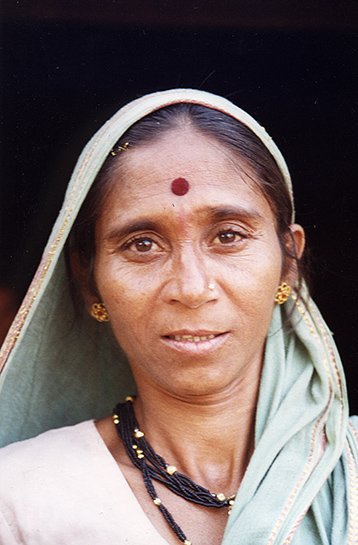
Renuka
Performer/Singer : Renuka Umbre
Village : Rajmachi
Taluka: Mawal
District: Pune
Caste: Mahadev Koli
Age: 37/38
Children: 2 daughters
Occupation: Farmers who cultivate red millet ( nachani/ ragi )
Date: These songs were recorded on March 15, 1997
Photos: Bernard Bel and Samyukta Shastri
Poster: Samyukta Shastri and Sinchita Maji
